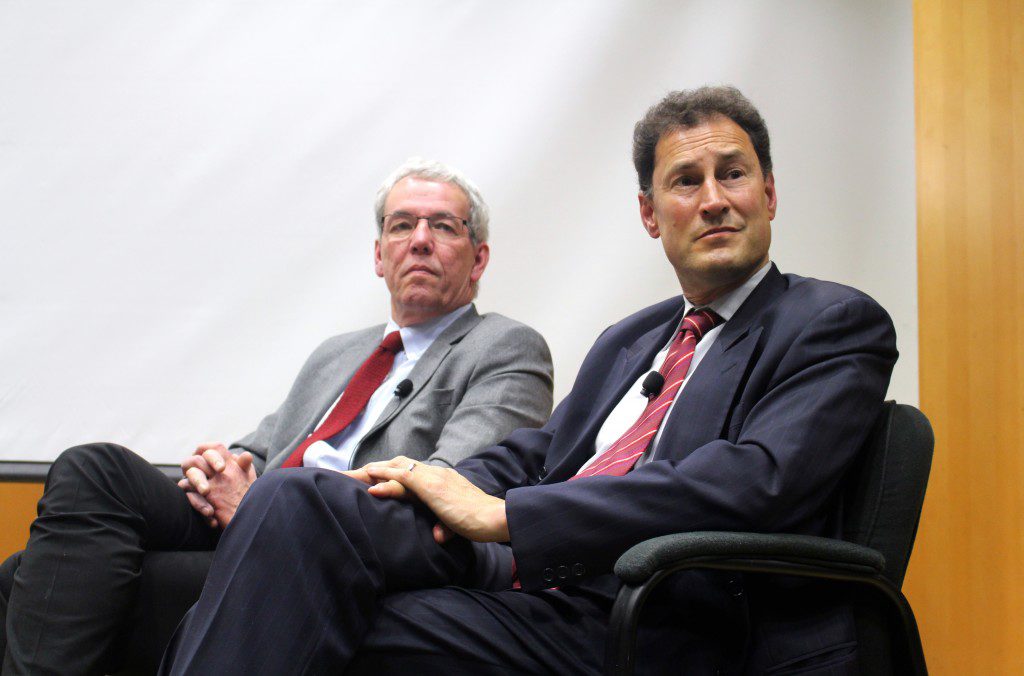By ROBERT LIWANAG
Staff Reporter
News organizations often promote particular narratives in the stories they cover in an attempt to persuade audiences to accept a particular value system or political perspective, says the former head of Al Jazeera English and CBC News.
Citing The Guardian and tabloid newspapers in Great Britain as examples, Tony Burman said that when readers choose to read those publications, they make a conscious decision about what viewpoint they want to hear about. He pointed to Fox News as another example of a news organization that covers stories from a particular political perspective. While he described Fox as “criminally incompetent,” he said it is nonetheless successful because its coverage is in tune with what its audience wants.
“When you watch or read or listen (to the news), you’re not seeing, kind of, the output of a multitude of individuals, you’re seeing a collective, strategic approach to news,” said Burman, a journalist and distinguished visiting professor at Ryerson’s Faculty of Communication and Design. “And I think that’s where, particularly citizens, should beware.”
Burman made his comments during a Feb. 24 panel – entitled “Propaganda: Are We Victims Too?” – that was sponsored by Ryerson University’s Faculty of Communication and Design. In addition to Burman, the panel included fellow distinguished visiting professors Bernie Lucht, a longtime radio producer for the CBC; Steve Paikin, anchor of TVO’s The Agenda; and James Turk, former executive director of the Canadian Association of University Teachers. About 70 people attended the panel discussion, moderated by Marci Ien, news anchor and co-host for CTV’s Canada AM, who is also a distinguished visiting professor.
Partisan news sources have become more prevalent over the years but Burman noted that they aren’t necessarily producing informed citizens. He pointed to a 2012 survey undertaken by PublicMind, a research group from Fairleigh Dickinson University, which found that NPR is one of the most informative news outlets. The most uninformed Americans, meanwhile, watch partisan sources such as Fox News and MSNBC. PublicMind polled 1,185 random people and asked them four to eight questions each. The survey also found that citizens who watch no news at all are more knowledgeable about current international events than those who watch cable news, and concluded that exposure to partisan sources negatively impact a person’s familiarity with current events.

The panelists agreed that open-mindedness on the part of audiences is essential if news organizations are expected to cover stories they may find shocking or provocative. Steve Paikin pointed to an episode of The Agenda broadcast last December featuring Russian political scientist Aleksandr Dugin, who is widely known as “Putin’s brain.” The decision to have him on as a guest, Paikin said, garnered harsh criticism from Twitter users.
“I’m sort of at a loss as to what we’re supposed to do in that circumstance,” said Paikin. “Do you not want to know what the Russian point of view is on some of the biggest issues of the day? I mean, surely we do. Even if they’re objectionable, surely we do.”
The panelists also debated perceived bias surrounding the term “terrorism” in relation to what police say was a thwarted Valentine’s Day attack on a Halifax area mall by three shooters. Two of the suspects were arrested on Feb. 13, while the third was found dead at his residence.
In the aftermath of the arrests, Justice Minister Peter MacKay sparked controversy when he said that the planned attack was “not linked to terrorism” because it was not “culturally motivated.”
In the wake of 9/11, Burman noted, American news coverage did not mention that the Bush administration had key information that could have prevented the attacks because it “didn’t fit the narrative,” which at the time was that terrorism was a serious global threat.
Paikin said the Harper government’s paranoia surrounding terrorism has steadily grown since the Oct. 22 Parliament Hill shootings in Ottawa. Propaganda, he added, is not only a tool employed by governments, but also by opposing political parties.
“They all try to persuade sometimes by untrue or nefarious methods,” he said.
Turk insisted that that there is a difference between bias and propaganda. If the definition of propaganda is to persuade, he said, then anti-smoking campaigns are technically propaganda, even though they are not perceived as such by society because they are seen as positive causes.
“The problem (with the media) isn’t bias, the problem is misrepresentation – deliberate misrepresentation and deliberate exclusion of things that would be relevant,” he said. “To call that bias is wrong. I think we have to give it some other name, but I don’t think propaganda’s the name either.”
